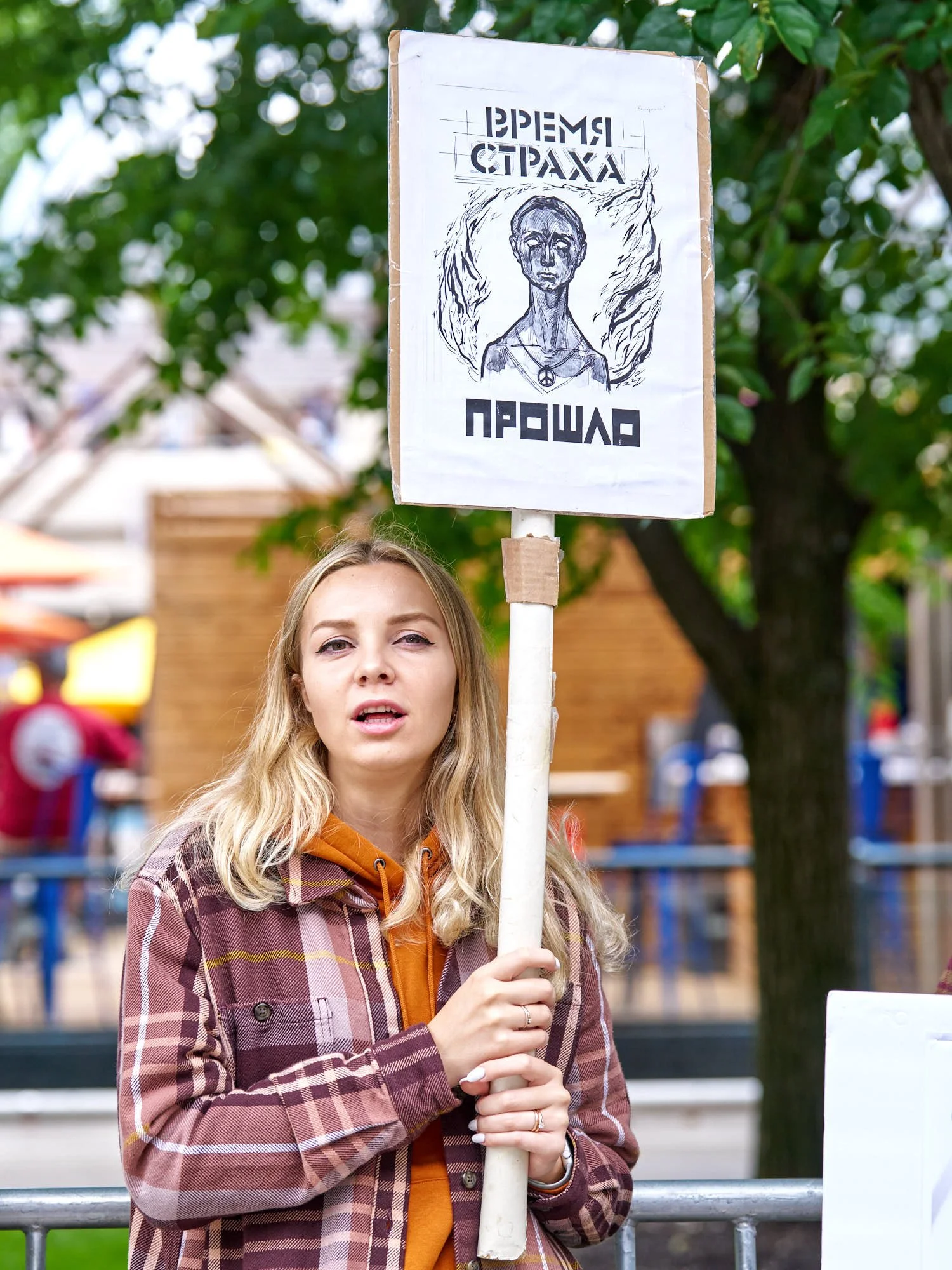Spotlight On Belarus
Following Russia’s invasion of Ukraine on February 24, 2022, members of Chicago’s Ukrainian Community took to the streets of Ukrainian Village to voice their support for Ukraine. Over the ensuing months, I photographed several similar demonstrations in Ukrainian Village, on Michigan Avenue, and in Millennium Park.
After several months, I noticed that members of Chicago’s Russian Community were holding separate demonstrations on behalf of Ukraine. Like the Ukrainians, the Russians were focused on Vladimir Putin, the mastermind behind the invasion of Ukraine. Gradually, I realized the Russians had a second agenda. At one demonstration, they celebrated Alexei Navalny’s birthday. At another, they demanded the release of Putin’s political prisoners. At every demonstration, there were Ukrainian flags and signage supporting Ukraine’s war effort, but overtime, the demonstrations evolved, with a focus on Putin the corrupt autocrat, rigged elections, and captive dissidents, opposition leaders, and journalists.
Today, I thought I would be attending another demonstration held by Russian émigrés and U.S. citizens of Russian heritage. When I arrived, I realized that the focus of this demonstration was not on Russia, but rather on the fight for freedom in Belarus.
During 2020, Belarusians participated in massive demonstrations against Alexander Lukashenko, who was seeking his sixth term as Belarus’ president. The U.S. State Department states that the citizens of Belarus have been unable to choose their government through free and fair elections—in other words, the elections were rigged, with pre-determined results. Consequently, when the election results were announced on August 9, 2020, the protests intensified.
On August 14, 2020, Sviatlana Tsikhanouskaya, Lukashenko’s main opponent, announced that she had created the Coordination Council. Anyone who believed that the election results had been falsified was invited to join. On September 17, 2020, the European Parliament declared that the Coordination Council as the “interim representation of the [Belarusian] people.” The Council has since created the National Anti-Crisis Management, a shadow government.
According to the official election results, Tsikhanouskaya received roughly 10% of the votes, while Lukashenko received 81% votes. The European Union refused to accept the results, going so far as to impose sanctions on Belarusian officials who were responsible for the “violence, repression and election fraud.” According to one source, even supporters of Lukashenko were skeptical about his wide margin of victory.
The 2020-21 protests have been dubbed the Slipper Revolution because at one demonstration protesters pelted riot police with slippers. The protests also have been dubbed the Anti-Cockroach Revolution, a moniker that has its origins in the title of a 1923 children’s poem penned by Korney Chukovsky. The poem is about “a dictatorial yet fragile insect and his brief, chaotic reign of terror over all the other animals.” Lukashenko now being the cockroach.
Given that Lukashenko was firmly in control of the state’s security apparatus, nobody was surprised when opposition activists, protesters, journalists, and bloggers were subjected to kidnapping, arrest, and murder. Today’s demonstration marked the fourth anniversary of the Slipper Revolution.
The signage said all that need to be said; calling on the international community to support the 1,390 political prisoners currently being held in Belarus. The demonstrators also demanded that Lukashenko be held accountable for his crimes. Several demonstrators held signs with images of people who have been murdered or kidnapped.
As far as demonstrations go, this was a particularly small and low-key one—maybe 50 people in attendance. At the start, one man led the group in a chant, but for the most part, the demonstrators simply stood silently on the sidewalk wearing color-coordinated shirts and dresses—red and white. Two or three people, including a young woman who probably was 13- or 14-years-old, handed out informational flyers to passersby.
I asked several demonstrators about their legal status. I was not surprised to learn that several had applied for American citizenship, or were first-generation U.S. citizens. In a sense, that speaks well of Chicago. Like their Russian and Ukrainian counterparts, these recent émigrés from Belarus apparently feel comfortable in our city. Once again, I take great pleasure in witnessing them exercise their First Amendment rights in a country where people can still speak out without fear of arrest, torture, imprisonment, or murder.
After about an hour, I asked my Russian friend whether anything else was planned for the day. He advised me that it probably was safe to move on because most of those who had planned to attend had arrived.
[Click on an Image to Enlarge It. The Images Are Not Necessarily in Exact Chronological Order]
Under An Umbrella
Spelling It All Out
One of the Regulars at Russian Rallies Joins the Belarusians
Recounting What Has Happened in Belarus
"30 Years Without a Choice"
Listing the Number of Arrests
Something Has Caught Their Attention
Wearing the Flag
Some of the 1,385 Political Prisoners
From Behind The Line
"What Is The Purpose of The Rally?"
Handing Out Leaflets
Just Passing By
An Illustration for The 1921 Children’s Poem, Tarakanishche (The Monster Cockroach)
Copyright 2024, Jack B. Siegel. All Rights Reserved. Do Not Alter, Copy, Display, Distribute, Download, Duplicate, or Reproduce Without the Prior Written Consent of the Copyright Holder.





